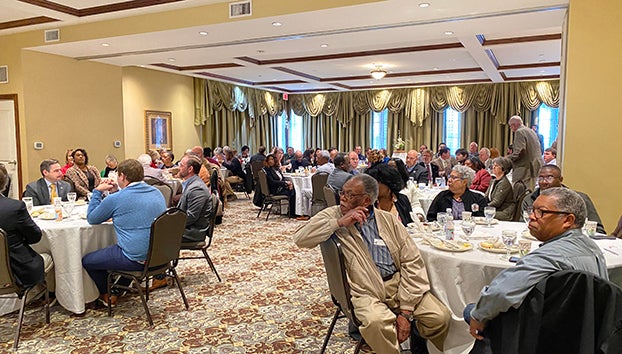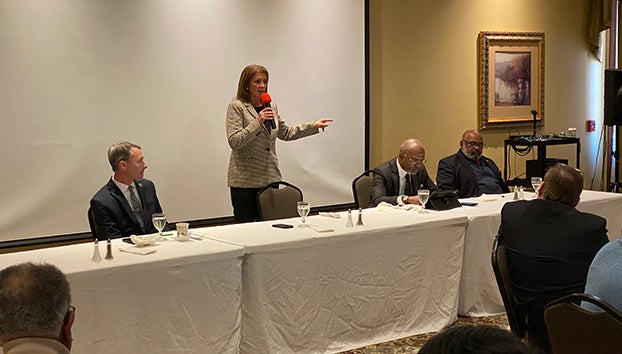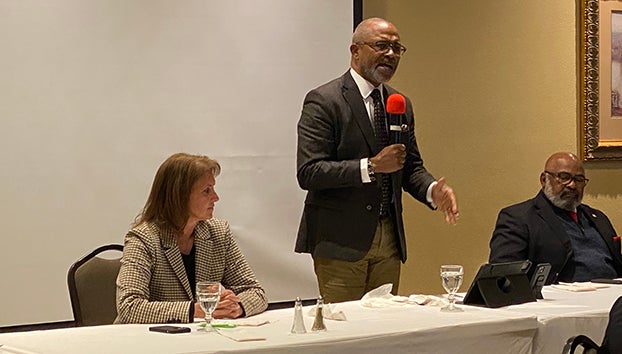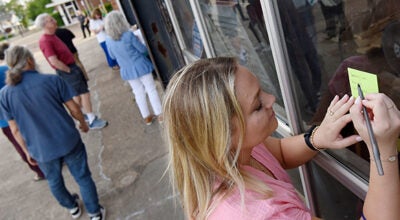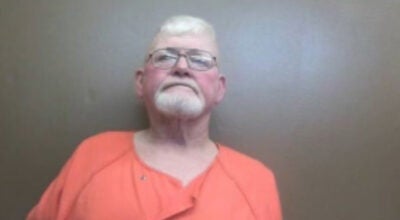Healthcare hot topic at Chamber’s annual Legislative Breakfast
Published 10:10 pm Monday, January 23, 2023
|
Getting your Trinity Audio player ready...
|
NATCHEZ — A standing-room-only crowd greeted Natchez’s representatives in the state House and Senate at the Natchez-Adams County Chamber of Commerce’s annual Legislative Breakfast Monday morning.
State Sen. Melanie Sojourner, R-Natchez, State Rep. Sam Mims, R-McComb, State Rep. Robert Johnson III, D-Natchez and State Sen. Kelvin Butler, D-Magnolia, each spoke about what they see as priorities for the legislature, which is about three weeks into its 90-day session in January.
Natchez Mayor Dan Gibson welcomed the legislators, as did Adams County Board of Supervisors President Warren Gaines.
Gibson and Gaines laid out a list of projects important to Natchez to which the city would look to the legislators for support, like drainage issues, continued improvements to rail and air service in the county and the creation of a liquid loading dock at the Natchez-Adams County Port.
Gibson urged the legislators to continue support of movie tax credits, which he said have been responsible for creating numerous jobs and tax dollars into the Natchez and Adams County economy.
Gibson also urged legislators to throw their support toward expanding Medicaid in Mississippi, which he said has been “proven to work in so many states. Let’s look at the states where Medicaid expansion has been successful and follow their example.”
Gaines also urged continued support from legislators for the Natchez-Adams County Airport and Port, and highlighted work the county is doing to help those with mental health issues, crime prevention through installation of Project NOLA cameras and work with Natchez Inc. to attractive new industry to the county.
How to best solve the health care crisis among Mississippi hospitals was the hottest topic of the day. It was clear from comments from each legislator that deep division exists between the two parties, particularly where health care is concerned.
State Sen. Kelvin Butler
State Sen. Kelvin Butler urged city and county officials to continue to work together, which he said is paying dividends for the area.
“Give the City of Natchez and the county another round of applause,” he said. “I represents five counties, so I deal with five boards of supervisors. I see a lot of things in this area that I don’t see in a lot of my other counties, and that’s a good thing. Continue to work together because that’s what it’s going to take to get to the next level.”
Butler listed as his priorities for the 2023 legislative session solving the state’s health care issue, obtaining more money for cities, towns and counties to deal with infrastructure issues, increasing the state’s minimum wage and finding more money to pay teachers and provide better educational opportunities for students.
“This year, the Democratic Caucus is pushing again to expand Medicaid under the Affordable Care Act so our uninsured citizens can have a means to get the medical care they need to maintain their health and to maintain critical health conditions that often require high dollar medications that they sometimes struggle to afford,” Butler said. “Our rural health care crisis has seen hospitals shutting down, fewer doctors working in rural areas and hospital emergency rooms seeing increased traffic from patients who come as a last resort.
“In many instances patients could avoid an emergency room visit if they had the daily medication they need to control their problem, but many people cannot afford the medicine. When faced with the choice of paying their light or gas bill and buying $90 bottles of medication because they don’t have the insurance to drop that to $5, they don’t buy the medicine,” Butler said. “I have been told that it will cost $200 million to expand Medicaid in our state. Most of you are business people right? When you invest $200 million and get a $1 billion return, to me that’s a no brainer, especially with all the money the state of Mississippi is sitting on, that’s a no brainer…That’s economic development for the entire state.”
State Sen. Melanie Sojourner
State Sen. Melanie Sojourner said she agrees Mississippi has a healthcare crisis, but Medicaid expansion is not the answer.
“Healthcare should take up the bulk of our session. There is no doubt hospitals are in crisis. There is no doubt there are areas of the state where it is worse than others. There is also no doubt there is a big divide between Democrats and Republicans as to how we address this problem,” Sojourner said.
Education and Medicaid currently take up three-quarters of the state’s budget.
“One thing I want to say is we operate on roughly a $6.5 billion budget and right off the top, half of that budget goes toward education. Another billion dollars goes to Medicaid. You see, we are already at three-fourths of our budget, and rural roads and bridges are a huge issue,” she said. “Last year, there was a reason why I asked to move the lottery money from extra education funding to roads and bridges because of that crisis.”
Sojourner said she expects little will happen other than a Band-Aid to fix the healthcare crisis this year.
“It is an election year and a lot of people are already speculating at the capitol on what are we going to do on some of these issues because look, fixing healthcare is not easy. It’s been 12 years since I first went to Jackson and 12 years we have been talking about this issue and not one time have I sat in a room and thought there were legitimate solutions brought to the table, not even from the healthcare industry, as to how to address this issue because these aren’t easy issues,” she said.
Medicaid is a broken and flawed system, Sojourner said, and studies have shown that expansion of Medicaid does not provide better health outcomes and moves citizens from private insurance to Medicaid.
“Health care is broken and hospitals need help. That is true, but I don’t think accepting more federal dollars coming down from a federal government that is $32 trillion in debt is the only solution,” she said. “I don’t expect this issue to get fixed this year because your politicians in Jackson are too busy worrying about running for re-election to fix this problem.”
Sojourner, who will not be in a position to run again because her district was lost during re-districting after the 2020 census, said she will not seek another office this year and would not run against Mims for the State House.
“This will be the last time I join you in this position at this breakfast. It’s been 12 years ago when I first came and asked you for your vote and was elected your state senator. It has been an absolute honor to serve,” she said.
State Rep. Sam Mims
Mims said the good news is Mississippi’s economy is doing well and the best it has ever been.
“I do want to talk some good news. I think if you look at our legislative session last year, it was highly productive with reducing the income tax, spending the ARPA money, helping with rural water and your wastewater treatment plants,” Mims said.
“If you look at our economy today in Mississippi, we are doing very well. Our income tax receipts are up. Our capital receipts are up. Our people are working more and making more money. Our economy in the state of Mississippi is doing very, very well. Our unemployment rate is at the all-time lowest it has ever been in history. Our rainy day account is about $570 million. We have $1.5 billion extra we can spend and in addition to that, we still have to spend about $300 million of our ARPA money during this session,” Mims said.
While Mims praised the Mississippi economy, he criticized politicians in Washington, D.C.
“In my years serving in the legislature, I have never seen more of a disconnect between what’s happening here in Mississippi and what’s happening in D.C.,” he said. “While we are getting things done in the Mississippi House, you look at D.C., it’s just a disconnect.
“I think it’s important we understand what’s happening in D.C. with inflation, with interest rates increasing and we have to be aware if something happens down the road in D.C., we are going to be financially stable here in Mississippi because we have made some good policies with our economy. We are in the best financial shape we have been in in years,” Mims said.
For the 12th year, Mims serves as chairman of the state senate’s public health committee.
“I do believe in access to healthcare and we have passed many compacts to make it easier to get as many nurses and physicians as we can. We do need to look at healthcare and I do envision in the next few weeks we are going to find some ideas to help hospitals and nursing homes.”
State Rep. Robert Johnson III
“I will say it’s a little bit disingenuous to talk about the disconnect in the state of Mississippi and how well we are doing and what’s happening in Washington and also talk about we have a $3 billion surplus in the state and mention ARPA four or five times when that has come from Washington and the reason we have a surplus is because we have had billions of dollars in CARES money and ARPA money when the only people who voted to pass that were Democrats,” in Congress, Johnson said.
“Every Republican legislator we have in Washington has said no the money we are now championing as the reason we are doing so well. So, it’s a little bit disingenuous to say we are doing well,” Johnson said.
He said Mississippi is giving back $500 million in tax dollars to citizens, “that puts $300 or $400 a year in Mississippians’ pockets when individuals are spending on average $800 each for car repairs” because of the poor condition of Mississippi’s roads and bridges.
“But they are saying they are giving you an income tax cut in a state that still has the highest rate of poverty, the lowest per capita income and more children in poverty than any state per capita in the country. That doesn’t make any sense,” Johnson said.
“That’s not an economy that’s doing well. That’s not a government that’s doing its job. And we have to stop deluding ourselves to think this comes down to Democrat or Republican. What it comes down to is what do you want to do as a government in Mississippi to serve Mississippians,” he asked.
“You want to talk about Medicaid expansion costing so much? We are only one of 11 states that said no to money that will ensure that working Mississippians will have health coverage. Let me give you a little background,” Johnson said.
The Hill-Burton Act, originally passed after World War II and further modified in 1968, was designed for rural and poor states like Mississippi to build hospitals.
“They understood in rural areas, the population density didn’t justify having a hospital, but the federal government said we want you to have a hospital because it’s important for the growth and survival of your community,” Johnson said, “so the Hill-Burton Act funded public hospitals.”
In an effort to reform healthcare and make it work better, he said, “if you go to a hospital in this state, they have to see you. When they see you in a hospital, those hospitals have to absorb those costs. Before the Affordable Care Act, hospitals could be reimbursed for people who received uncompensated care. When they passed the Affordable Care Act, they said we are not doing uncompensated care at the same level we have been doing it, but you still have to see those people who don’t have insurance.
“You have working people in a rural state like Mississippi. We don’t have a lot of high-paying factory jobs, but we do have a lot of carpenters and plumbers and small business people who make enough money to take care of their families, but they may not make enough money to buy health insurance coverage. They also don’t qualify for Medicaid and Medicare. When they go to a hospital, the hospital has to see them, but the hospital is not reimbursed like they once were.”
He said the federal government is now offering Mississippi $1 billion per year to expand Medicaid because Mississippi has 170,000 working people who have no insurance.
“It will save the state money. Last year, we had two state economists, who were probably Republicans, who said yes, Medicaid expansion is a good thing. It’s going to make the state money,” Johnson said. “But we can’t get people to sit down and talk about something that is going to help Mississippians. You are going to tell me it’s OK for a woman who is having a baby that she must drive 50 miles to go to a hospital because we let her hospital fail,” he asked. “That’s one thing we owe as a government is to provide health care to people who are working every day.”


